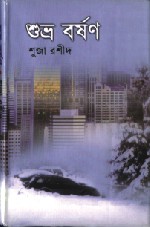|
How about some Bangladeshi Diaspora?
Jackie
Kabir
Bangladeshis
these days read or talk more about immigrant or diaspora
literature than works written by writers from other countries.
Writers, especially novelists, of South Asian origin have
and are doing very well in world literature. Novels written
by immigrant writers are shedding light on the different
aspects of their immigrant lives in, what they say, an alien
culture. In the early 1980s, works of barely ten South Asian
writers were seen in the literary world, and now it has
been replaced by ten new writers every year. This trend
is likely to continue in the coming years.
 Another
set of writers who write both in English and their native
language are gaining popularity in the literary world. Some
of them talk about how the immigrants struggle either to
blend in the crowd or strife to keep up their identity.
It makes one wonder if the immigrants are really at home
or in a faraway home. Some writers, especially those from
Bangladesh, present the flashy lifestyle, which only shows
a part of their life in a foreign land. Another
set of writers who write both in English and their native
language are gaining popularity in the literary world. Some
of them talk about how the immigrants struggle either to
blend in the crowd or strife to keep up their identity.
It makes one wonder if the immigrants are really at home
or in a faraway home. Some writers, especially those from
Bangladesh, present the flashy lifestyle, which only shows
a part of their life in a foreign land.
Shuja
Rahid, an expatriate settled in Canada after spending a
good part of his life in the US, is one of those writers.
Unlike most of the Bangladeshis, Shuja tries to depict the
more indelicate and unexplored aspects that some of the
Asians have to go through while residing in the West.
Writing
in Bangla, Shuja's latest novel Shuvro Barshan, is a love
story of two Bangladeshis in a typical western backdrop.
The writer depicts the lives of Bangalis living in the US
in his book.
The
relationship between Dipu and Ava is a complicated one;
Dipu has difficulty in understanding the actual feelings
of the young woman whose beauty makes him forget what he
wanted to say every time she comes near him. Dipu has known
this strange beauty almost all his life without really comprehending
her.
Ava
calls Dipu one night to tell him to pick her up from the
airport the next day which was a working day for him. He
starts reminiscing his past when Ava had created a lot of
chaos in his life. Even his sister Pinkie finds Ava "irksome"
even though they practically grew up together.
Ava
had purposely stayed back at Dipu's place even though Pinkie
had offered her own place to stay for the night. But Shuja
is the perfect gentleman.
Ava
wants to tie some loose ends. When she inquires about Dipu's
anger towards her he explains that it was not her but the
kind of life he has to live in the US. The treatment the
people of the whole subcontinent got was blatantly discriminatory.
They were the minority there. It made him angry that 'these
white people' always looked down upon them even though they
had the same qualifications went to the same educational
institution etc. Ava does not seem to agree with him she
argued that all Americans were not the same.
The
book has an easy flow, which will attract readers for its
simple composition. Along with the complexities of the human
mind it also gives a vivid description of the lives of young
people who have migrated to foreign lands in the hope of
a better future. They try to find something they left back
home by regularly arranging to gather at someone's house
and spending time together.
The
weakness and the strength of these people are also portrayed
in a striking manner. Young girls like Ava try to find solutions
of their problems by talking to psychiatrists, visiting
witches. It also shows the realities of loneliness that
everyone feels while living in a faraway land - away from
familiarity.
There is another book by the same author which in a way
continues the story of Shuvro Barshan. This book titled
Ei Jatra portrays the conjugal life of the above mentioned
couple. It projects the identity crisis of the younger generation
of this communit. They cannot completely be Americanised
nor can they be completely Bangladeshi. This is something
all migrants feel even though few talk about it because
all the older generations want their offspring to be familiar
with their roots, their culture and also be proud about
it.
The
narrative style of the writer makes one hope that he may
at some point, start writing in English which will convey
these interesting nuances of Bangladeshi immigrant life
to a wider audience.
|

 Another
set of writers who write both in English and their native
language are gaining popularity in the literary world. Some
of them talk about how the immigrants struggle either to
blend in the crowd or strife to keep up their identity.
It makes one wonder if the immigrants are really at home
or in a faraway home. Some writers, especially those from
Bangladesh, present the flashy lifestyle, which only shows
a part of their life in a foreign land.
Another
set of writers who write both in English and their native
language are gaining popularity in the literary world. Some
of them talk about how the immigrants struggle either to
blend in the crowd or strife to keep up their identity.
It makes one wonder if the immigrants are really at home
or in a faraway home. Some writers, especially those from
Bangladesh, present the flashy lifestyle, which only shows
a part of their life in a foreign land.